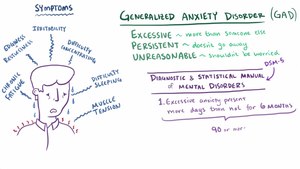General anxiety disorder
| Generalized anxiety disorder | |
|---|---|
| Video explanation | |
| Classification and external resources | |
| Specialty | Psychiatry |
| ICD-10 | F41.1 |
| ICD-9-CM | 300.02 |
| MedlinePlus | 000917 |
| eMedicine | article/916933 |
Generalized anxiety disorder (GAD) is an anxiety disorder characterized by excessive, uncontrollable and often irrational worry, that is, apprehensive expectation about events or activities. This excessive worry often interferes with daily functioning, as individuals with GAD typically anticipate disaster, and are overly concerned about everyday matters such as health issues, money, death, family problems, friendship problems, interpersonal relationship problems, or work difficulties. Individuals often exhibit a variety of physical symptoms, including fatigue, fidgeting, headaches, nausea, numbness in hands and feet, muscle tension, muscle aches, difficulty swallowing, excessive stomach acid buildup, stomach pain, vomiting, diarrhea, bouts of breathing difficulty, difficulty concentrating, trembling, twitching, irritability, agitation, sweating, restlessness, insomnia, hot flashes, rashes, and inability to fully control the anxiety (ICD-10). These symptoms must be consistent and ongoing, persisting at least six months, for a formal diagnosis of GAD.
Standardized rating scales such as GAD-7 can be used to assess severity of GAD symptoms. GAD is the most common cause of disability in the workplace in the United States.
In a given year, approximately two percent of American adults and European adults experience GAD. Globally about 4% are affected at some point in their life. GAD is seen in women twice as much as men. GAD is also common in individuals with a history of substance abuse and a family history of the disorder. Once GAD develops, it may become chronic, but can be managed or eliminated with proper treatment.
About a third of the variance for generalized anxiety disorder has been attributed to genes. Individuals with a genetic predisposition for GAD are more likely to develop GAD, especially in response to a life stressor.
...
Wikipedia

